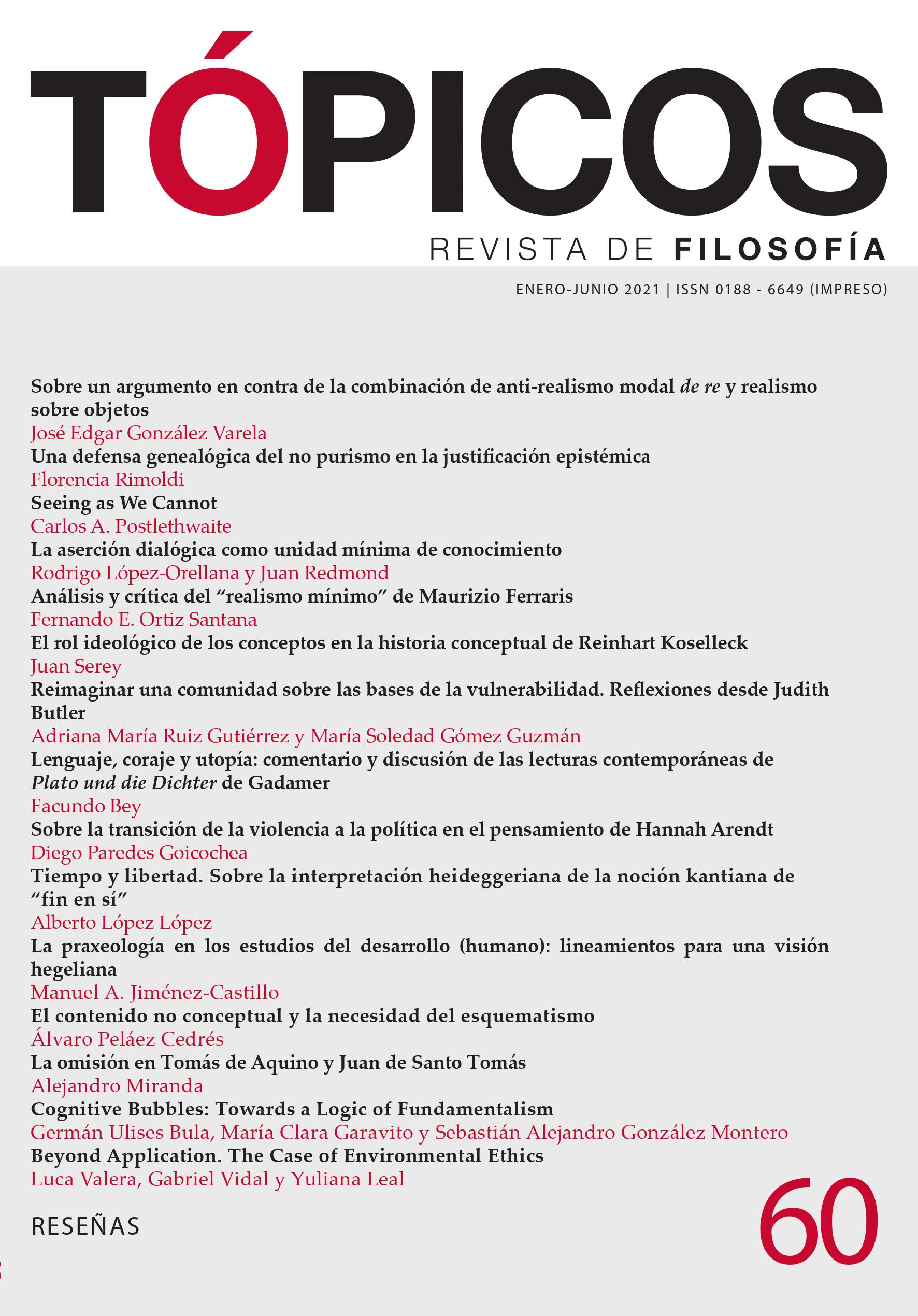Articles
Published 2020-10-27
How to Cite
Miranda, A. (2020). Omission in Thomas Aquinas and John of St. Thomas. Tópicos, Revista De Filosofía, (60), 375–410. https://doi.org/10.21555/top.v0i60.1159
Downloads
Download data is not yet available.
Altmetrics
Citas
Abstract
The aim of this paper is to analyze the doctrine of voluntary omissions in Thomas Aquinas and one of his seventeenth-century commentators, John of St. Tomas. It is argued that both authors made relevant contributions to the philosophical understanding of omissions, which can enrich the current debate on the subject. The paper begins by explaining some problems raised in contemporary philosophy while showing how those same problems were previously discussed in scholastic philosophy. Subsequently, it discusses in detail the contributions of Aquinas and John of St. Thomas.
References
- Aristóteles. (1994). Ética a Nicómaco. M. Araujo y J. Marías (trads.). Centro de Estudios Constitucionales.
- Aristóteles. (2007). Física. G. de Echandía (trad.). Gredos.
- Bach, K. (2010). Refraining, Omitting, and Negative Acts. En T. O’Connor y C. Sandis (eds.), A Companion to the Philosophy of Action. (pp. 50-57). Blackwell Publishing.
- Báñez, D. (1942). Comentarios inéditos a la Prima secundae de santo Tomás. Beltrán de Heredia (ed.). CSIC.
- Bennett, J. (1980). Morality and Consequences. The Tanner Lectures on Human Values.
- Brand, M. (1971). The Language of Not Doing. American Philosophical Quarterly, 8, 45-53.
- Brock, S. (1998). Action and Conduct. Thomas Aquinas and the Theory of Action. T&T Clark.
- Clarke, R. (2014). Omissions. Agency, Metaphysics, and Responsibility. Oxford University Press.
- De Aquino, T. (2000). Opera omnia. Recognovit ac instruxit Enrique Alarcón automato electronico Pompaelone ad Universitatis Studiorum Navarrensis. E. Alarcón (ed.). Universidad de Navarra. URL: http://www.corpusthomisticum.org/iopera.html.
- De Santo Tomás, J. (1964). Cursus theologici. In Primam Secundae divi Thomae commentarii. F. Protat.
- Dowe, P. (2004). Causes are Physically Connected to their Effects: Why Preventers and Omissions are not Causes. En C. Hitchcock (ed.), Contemporary Debates in Philosophy of Science. (pp. 189-196). Blackwell.
- Honoré, T. (1999). Are Omissions Less Culpable? En Responsibility and Fault. (pp. 41-66). Hart Publishing.
- Jensen, S. (2013). Omissions and their Causes. Acta Philosophica, 22, 117-133.
- Kaufmann, A. (2006). Dogmática de los delitos de omisión. J. Cuello & J. L. Serrano (trads.). Marcial Pons.
- McGrath, S. (2005). Causation by Omission: A Dilemma. Philosophical Studies, 123, 125-148.
- Moore, M. (2009). Causation and Responsibility. An essay in Law, Morals, and Metaphysics. Oxford University Press.
- Sartorio, C. (2005). A New Asymmetry Between Actions and Omissions. Noûs, 39, 460-482.
- Schaffer, J. (2000). Causation by Disconnection. Philosophy of Science, 67, 285-300.
- Weinryb, E. (1980). Omissions and Responsibility. The Philosophical Quarterly, 30, 1-18.
- Yaffe, G. (2017). The Duty Requirement. En D. Nelkin & S. Rickless (eds.), The Ethics and Law of Omissions. (pp. 199-216). Oxford University Press






